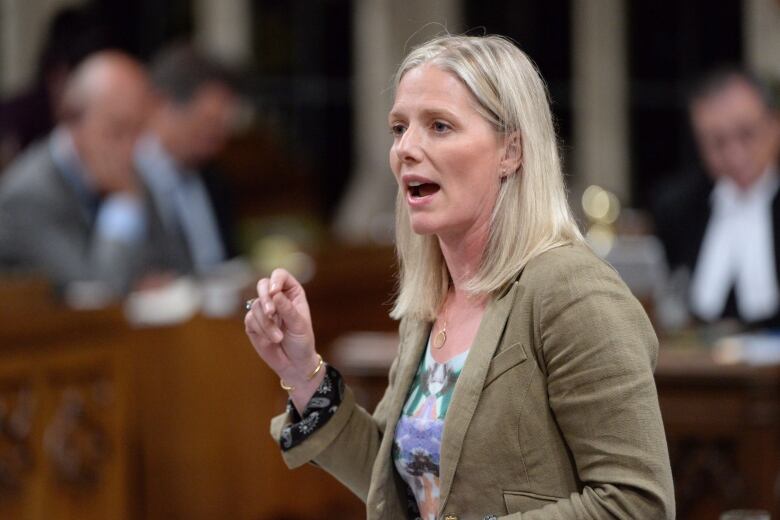National Energy Board fights to restore legitimacy at Quebec hearings
Can the public trust the NEB's recommendations after recent scandals?

The traveling road-show that is the National Energy Board hearings into the Energy East pipeline rolls into Montreal on Monday.
Its job, officially, is to hear from both pipeline supporters and opponents as it decides whether to approve TransCanada's application to build a 4,500-kilometre crude oil pipeline across the country.
- TransCanada willing to change Energy East pipeline route, official says
- Brian Jean says Montreal mayor 'interfering' with Energy East pipeline process
But, unofficially, the NEB will be fighting to restore the legitimacy of its proceedings in the eyes of the Quebec public.
A first round of hearings took place earlier this month in New Brunswick, the end point for a pipeline that will start in Alberta. They were fairly straightforward; the NEB heard from 54 interveners arguing the pros and cons of the project.
The challenge the board faces in Quebec, though, won't simply be weighing the various perspectives. It has to contend with both political and popular skepticism about its credibility.

Perception problem
As the New Brunswick hearings got underway, questions were being raised in Quebec about a meeting held last year between two NEB board members and former Quebec premier Jean Charest, who has worked for TransCanada on pipeline issues.
At first the NEB said Energy East wasn't discussed, but then National Observer journalist Mike De Souza turned up minutes from the meeting that showed it was.
The NEB apologized and claimed its panel members weren't aware that Charest was employed at the time by TransCanada.

Montreal Mayor Denis Coderre, a vocal opponent of the pipeline, said the meeting cast "the impartiality of the process" in doubt and called for the hearings to be suspended.
That call has been echoed by 36 environmental groups across the country, including Greenpeace, in a letter sent to the NEB.
"The fact the [Charest] meeting took place raises serious questions about whether the integrity of the Energy East project review process has been damaged," the letter reads.
Strange meetings
The Charest meeting was part of a series the NEB held with a number of interested parties before the public hearings started.
The point of the meetings, it said, was to develop ideas about how to engage the Quebec public in the upcoming hearings.

Along with Charest, the NEB also met with some municipal politicians and the environmental group Équiterre. The group's executive director, Sidney Ribaux, said he told the NEB members they found such meetings "strange."
Ribaux wondered why some potential intervenors were given the chance to meet with NEB members ahead of time and not others. He speculated the privilege of the advanced meeting wasn't likely extended to small municipalities and community groups.
"It's a question of fairness," Ribaux said recently. "Who gets these meetings, and who doesn't?"
NEB vs BAPE
The NEB's credibility deficit in Quebec is complicated by the fact that a parallel provincial environmental review process is underway by the Bureau des audiences publiques sur l'environment (BAPE), which does enjoy credibility in the eyes of many environmentalists.
"The BAPE has proven a very effective means of consulting intervenors and citizens in a fair way ... compared to the NEB," said Ribaux.
The difference, according to Ribaux, is that the NEB was never designed to conduct large-scale public consultations.

For much of its history it was largely concerned with the technical aspects of pipeline construction and management. The BAPE, on the other hand, has experience consulting both experts and the public.
Faced with mounting criticism of the NEB review process, federal Environment Minister Catherine McKenna recently urged Canadians to have "confidence in our system."
But, at the same time, the Trudeau government has convened an expert panel to review how the NEB approves projects.
In doing so, Ottawa may be sending mixed messages about how much even it trusts the NEB process.
Trust the process, trust the outcome
All this has the potential to create a major headache for the federal government, which ultimately gets to decide whether to green light the pipeline based on the NEB's recommendation.
A robust NEB review process would have provided Ottawa with cover for a contentious decision. The Liberals could have protected themselves from the political fallout by simply pointing to the impartiality of the NEB decision-making process.
But with every perceived misstep by NEB, that outcome becomes increasingly unlikely.
If the NEB process is compromised in the eyes of the public, so too will its final decision.

